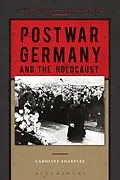CHOICE Outstanding Academic Title 2016 Focussing on German responses to the Holocaust since 1945, Postwar Germany and the Holocaust traces the process of Vergangenheitsbewältigung ('overcoming the past'), the persistence of silences, evasions and popular mythologies with regards to the Nazi era, and cultural representations of the Holocaust up to the present day. It explores the complexities of German memory cultures, the construction of war and Holocaust memorials and the various political debates and scandals surrounding the darkest chapter in German history. The book comparatively maps out the legacy of the Holocaust in both East and West Germany, as well as the unified Germany that followed, to engender a consideration of the effects of division, Cold War politics and reunification on German understanding of the Holocaust. Synthesizing key historiographical debates and drawing upon a variety of primary source material, this volume is an important exploration of Germany's postwar relationship with the Holocaust. Complete with chapters on education, war crime trials, memorialization and Germany and the Holocaust today, as well as a number of illustrations, maps and a detailed bibliography, Postwar Germany and the Holocaust is a pivotal text for anyone interested in understanding the full impact of the Holocaust in Germany.
Autorentext
Caroline Sharples is Research Fellow in the Centre for German-Jewish Studies at the University of Sussex, UK. She is the author of West Germans and the Nazi Legacy (2012) and co-editor, along with Olaf Jensen, of Britain and the Holocaust: Remembering and Representing War and Genocide (2013).
Zusammenfassung
CHOICE Outstanding Academic Title 2016Focussing on German responses to the Holocaust since 1945, Postwar Germany and the Holocaust traces the process of Vergangenheitsbew ltigung ('overcoming the past'), the persistence of silences, evasions and popular mythologies with regards to the Nazi era, and cultural representations of the Holocaust up to the present day. It explores the complexities of German memory cultures, the construction of war and Holocaust memorials and the various political debates and scandals surrounding the darkest chapter in German history.The book comparatively maps out the legacy of the Holocaust in both East and West Germany, as well as the unified Germany that followed, to engender a consideration of the effects of division, Cold War politics and reunification on German understanding of the Holocaust. Synthesizing key historiographical debates and drawing upon a variety of primary source material, this volume is an important exploration of Germany's postwar relationship with the Holocaust.Complete with chapters on education, war crime trials, memorialization and Germany and the Holocaust today, as well as a number of illustrations, maps and a detailed bibliography, Postwar Germany and the Holocaust is a pivotal text for anyone interested in understanding the full impact of the Holocaust in Germany.
Inhalt
Introduction: Germany and the Holocaust
1. Confronting the Holocaust, 1945-9
2. 'Victims of Fascism': Narratives of German Suffering since 1945
3. Acknowledging Suffering: Recalling the Victims of Nazi Racial Persecution since 1945
4. The Pursuit of Justice
5. The German Churches and the Holocaust
6. Memorializing the Holocaust
7. The Holocaust on Screen: Representations of the Nazi Genocide in German Film and on German Television
8. Holocaust Education in Germany
Conclusion: How the Holocaust Looks Today
Notes
Bibliography
Index
